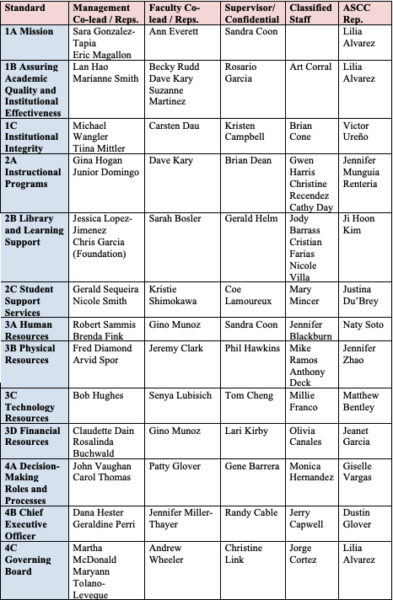Go to the Citrus College website and search for its mission statement. In this statement, the college attests its goals for the students to successfully complete degrees, transfer, certificates and career/technical education.
Accreditation is the process of the school proving this statement. The college must show its mission, goals and objectives are not just words, but factual.
Without accreditation, a student’s time at Citrus College would be far less meaningful.
Last January, the Accrediting Commission for Community and Junior Colleges deemed Citrus College worthy of the maximum extension of accreditation. Citrus is now an accredited institution for the next seven years. The college will not have to worry about its status until the midterm check up after year three of this extension.
The process of accreditation was an almost two-year odyssey. Citrus compiled a self-evaluation booklet known as the Institutional Self-Evaluation Report to turn into the ACCJC. This 228-page document was built by the hard work and passion of over 80 various Citrus College members.
Everyone from the former and current vice presidents of academic affairs to different Associated Students of Citrus College representatives over the last four semesters played a hand in the success of this project.
The accreditation process requires the college to prove it meets four standards and three to four subsections for each.
Citrus devoted a team of students, classified staff, supervisors, managers and faculty to each standard and sub-standard. Each group was specialized with the subject of each standard.
Vice President of Academic Affairs Joumana McGowan served as the accreditation liaison officer, a position that oversees the completion of the Institutional Self Evaluation Report.
“It really took a village. I can not genuinely say it was one person, two people, three people,” McGowan said. “It was really about 80 people that got together and put this thing together.”
After each group compiled its information for each part of every standard, three members of the committee compiled the report to give it a singular voice. These members were former Vice President of Academic Affairs Arvid Spor, faculty co-chair Catherine Besancon and dean of social behavioral sciences Dana Hester.
“We didn’t sugar coat anything. We were very candid and very honest,” McGowan said. “We were making sure that the self-evaluation process was meaningful to us. It mattered more about how we saw ourselves than a committee coming in evaluating us.”
Superintendent/President Greg Schulz recognized the accreditation team’s diligence and success.
Schulz said in a memo to the community on Feb. 7, “(The accreditation process) has been a collective effort, and we are very proud of these impressive results.”
McGowan joined the process with her hiring at Citrus in December 2020. At this point, she immediately had high expectations for the decision over a year later.
“When I came on board in December, I was adamant we were going to do a phenomenal job,” McGowan said.
Besancon was proudest of the effort and sacrifice that everyone put into this process.
“(The accreditation team) put in countless hours and just incredible amount of effort and work to show what we do as a college,” Besancon said.



